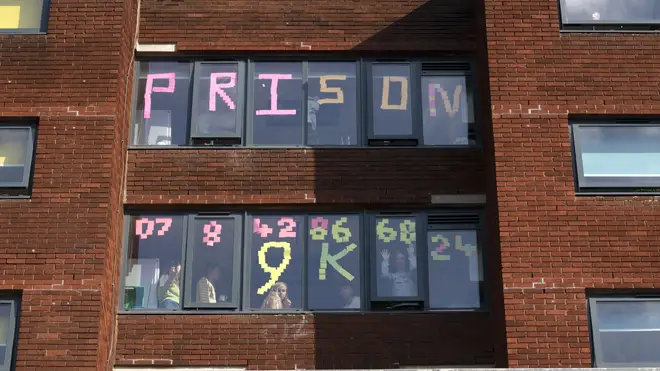
Clive Bull 1am - 4am
7 October 2020, 06:39 | Updated: 7 October 2020, 20:35

Five of the country's largest universities have shifted to online classes due to coronavirus outbreaks.
Manchester University, where there have been 382 coronavirus cases since September 21, Manchester Metropolitan University and the University of Sheffield have announced a move to online learning to protect the health of students and staff.
Newcastle and Northumbria Universities have also announced their move to online classes, which will last at least three weeks.
It came after staff threatened to ballot for industrial action over Covid health and safety failings.
It was announced today that another 79 students had tested positive for coronavirus at Sheffield University.
A total of 669 students and staff at the university have now had confirmed cases since the start of the autumn term.
More than 50 universities in the UK have confirmed cases of Covid-19, after thousands of undergraduates returned to campus for the start of the autumn term.

Government not students to blame for student COVID spikes
The Manchester universities said they had made the decision together in consultation with the area's director of public health, supported by Public Health England.
They added they would increase the level of online learning for most programmes from Wednesday until October 30, which would be reviewed on October 23, and face-to-face teaching would continue for some clinical or practice-based classes.
The University of Sheffield - where nearly 500 students and staff have tested positive since the start of term - said face-to-face teaching would continue on Wednesday and Thursday before it is suspended from Friday, with in-person classes to resume on October 19.
The move comes amid rising cases across parts of England, with the latest weekly infection figures showing Manchester's rate has soared, with 3,105 new cases recorded in the seven days to October 3 - the equivalent of 561.6 cases per 100,000 people.
Analysis by the PA news agency shows the UK-wide seven-day rate increased to 125.7 Covid-19 cases per 100,000 people from 63.8 a week ago.
The University and College Union (UCU) has welcomed the move by the Manchester universities but said virus outbreaks could have been prevented had the decision been made earlier.
In a statement, UCU north west regional officer Martyn Moss said: "It is clear the Government needs to stop pretending university campuses are well prepared for this crisis, and tell all universities to halt in-person teaching to control the spread of the virus."
Northumbria University announced on Friday that 770 students had tested positive to Covid-19, including 78 who were symptomatic, with those testing positive now self-isolating in their accommodation.
Newcastle is among the worst affected cities in the UK, with its council leader Nick Forbes joining the leaders of Leeds and Manchester to write to the Health Secretary on Tuesday calling for new national restrictions to slow the spread of the virus.
Eugene Milne, Director of Public Health for Newcastle said: "We have worked closely with both of our Universities in containing and controlling the large outbreak among students and, while numbers are still growing, those measures show some initial signs of working.
“But as more students arrive in the city we need to take a precautionary approach, so we have collectively taken the decision to escalate the Universities’ Outbreak Control Plans to Tier 3.
“It is essential that changes are made to stop the virus spreading. Minimising opportunities for the virus to grow by moving more learning online and maintaining COVID-secure arrangements on campus are additional preventative measures on top of what was implemented previously.
"We will continue to work closely with both Universities to look at the impact of these measures and to discuss when they can be safely removed.
"A large number of students are already self-isolating and we are supporting efforts to provide them the support and resources they need in partnership with support services from both universities. Already, hundreds of food parcels have been delivered and we will continue to prioritise students’ welfare and wellbeing. I would appeal once again to the small number who are not following the guidance to think about the risk this poses not only to themselves but also the vulnerable people in the communities around them.
"The spread of the virus in our city is not specific to our student population and we must all continue to follow social distancing guidelines, wear face coverings where appropriate and stick to the latest local guidance. We must all work together to defeat this virus and we must all do our bit."
Earlier, the universities minister said students could call a new helpline if they had concerns about coronavirus.
Michelle Donelan announced the Department for Education (DfE) is launching a hotline this week - in conjunction with Public Health England (PHE) - dedicated to university staff and students.
The minister said it would be "unacceptable" for students to pay high tuition fees if an institution failed to provide support or high quality provision.
Ms Donelan added universities had the power to lower tuition fees if they did not believe they were providing a quality learning experience.
The universities minister said the DfE was working with institutions to bring forward the end of term to ensure students who needed to quarantine could still return safely to their families in time for Christmas.
She told the Education Select Committee: "What won't change is the fact that students can go home for Christmas. Whatever happens we will make sure that is a possibility."
Her comments come after education unions met with schools minister Nick Gibb and Ofqual chief Glenys Stacey about the timetable of the 2021 exams.